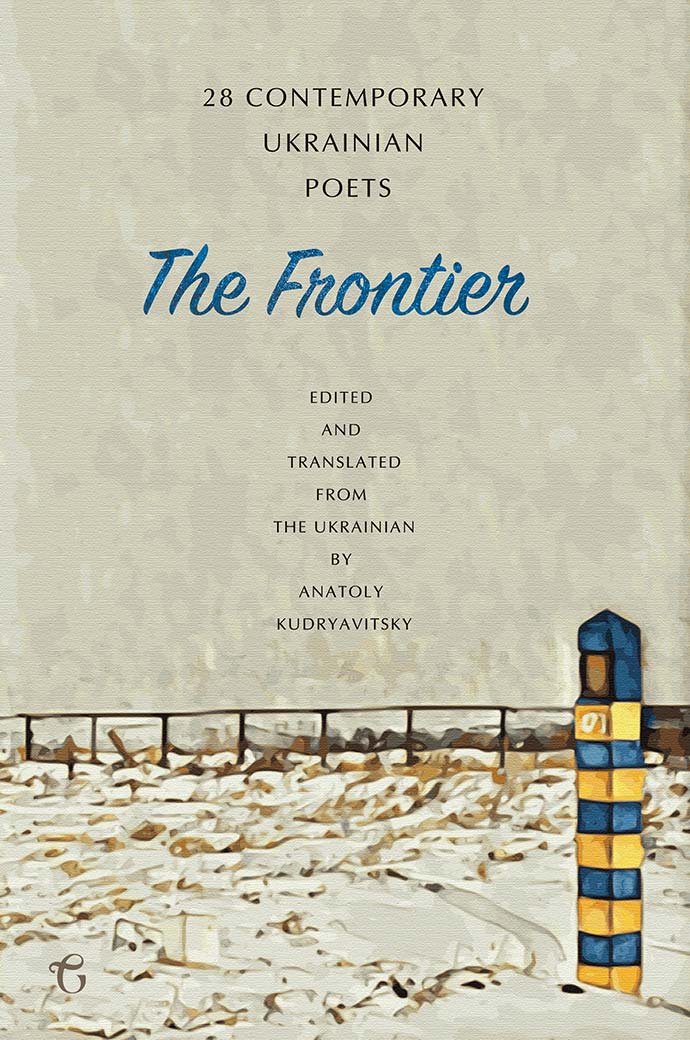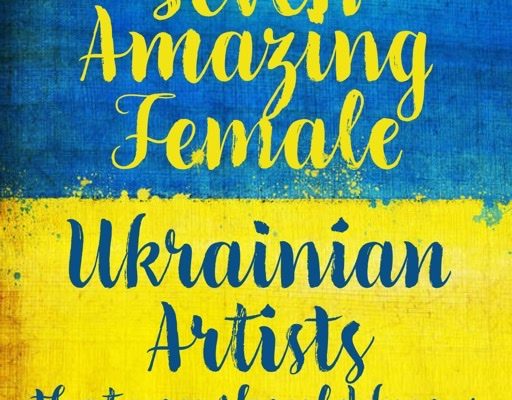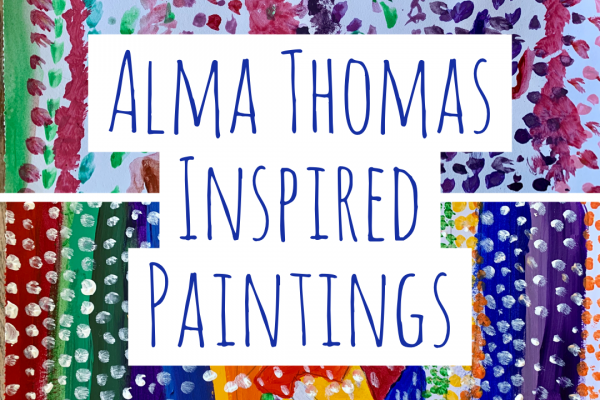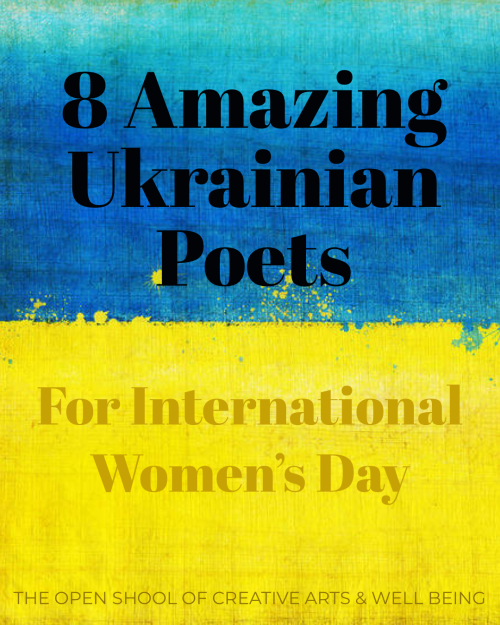
On International Women’s Day this year, as the world is shaken by an unprovoked war on Ukraine, it seems pertinent to share and celebrate Ukrainian women.
There are women fighting on the frontline, women caring for and rescuing children, women providing food and aid to refugees, women maintaining infrastructure in war torn cities, women standing defiant in the face of evil. While I wish this was not happening, I hope that all these stories are being told. They are important.
In this space we focus on artists, poets, writers and others who have been or are engaged with the creative, visual and performing arts. Therefore, starting today we will be producing a series of articles celebrating Ukrainian women involved in literature and the arts.
This article celebrates 8 incredible female Ukrainian poets. The list is in no way exhaustive, but does aim to be diverse and informative.
Disclaimer: This post may contain affiliate links. OSCAW receives a very small commission if products are purchased through these links. Commission is part of our profit, which is put back into our community interest company to support community projects and make our services available to those who cannot ordinarily afford them.
Lesia Ukrainka
“One thing is special about her: she did the most to break Ukrainian culture free from the image of provinciality imposed on it by the discourse of the Russian Empire around the turn of the 20th century.”
Born in 1871, Lesya Ukrainka was one of Ukrainian literature’s foremost writers, best known for her poems and plays. She was also an active political, civil, and feminist activist.
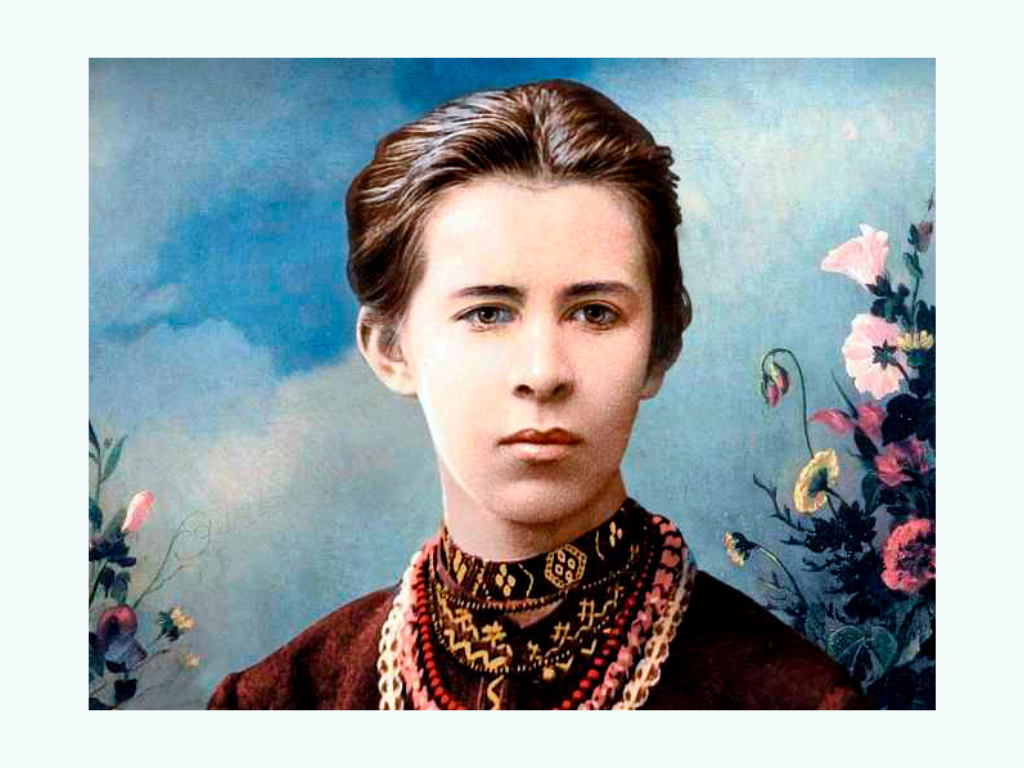
Contra Spem Spero! (I Hope Against Hope)
Away, dark thoughts, you autumn clouds!
A golden spring is here!
Shall it be thus in sorrow and in lamentation
That my youthful years pass away?
No, through all my tears I still shall laugh,
Sing songs despite my troubles;
Have hope despite all odds,
I want to live! Away, you sorrowful thoughts!
On this poor, indigent ground
I shall sow flowers of flowing colors;
I shall sow flowers even amidst the frost,
And water them with my bitter tears.
And from those burning tears will melt
The frozen crust, so hard and strong,
Perhaps the flowers will bloom and
Bring about for me a joyous spring.
Unto a winding, flinty mountain
Shall I bear my weighty stone,
Yet, even bearing such a crushing weight,
Will I sing a joyful song.
Throughout a lasting night of darkness
Ne’er shall I rest my own eyes,
Always searching for the guiding star,
The bright empress of the dark night skies.
I shall not allow my heart to fall sleep,
Though gloom and misery envelop me,
Despite my certain feelings
That death is beating at my breast.
Death will settle heavily on that breast,
The snow covered by a cruel haze,
But fierce shall beat my little heart,
And maybe, with its ferocity, overcome death.
Yes, I will laugh despite my tears,
I’ll sing out songs amidst my misfortunes;
I’ll have hope despite all odds,
I will live! Away, you sorrowful thoughts!
Natalka Bioltserkivets
Natalka Bilotserkivets’s work, known for lyricism and the quiet power of despair, became hallmarks of Ukraine’s literary life of the 1980s. The collections Allergy (1999) and Central Hotel (2004) were the winners of Book of the Year contests in 2000 and 2004 respectively.
In the West, she’s mostly known on the strength of a handful of widely translated poems, while the better part of her oeuvre remains unknown. She lives and works in Kyiv. Her poem, “We’ll Not Die in Paris,” became the hymn of the post-Chornobyl generation of young Ukrainians that helped topple the Soviet Union.
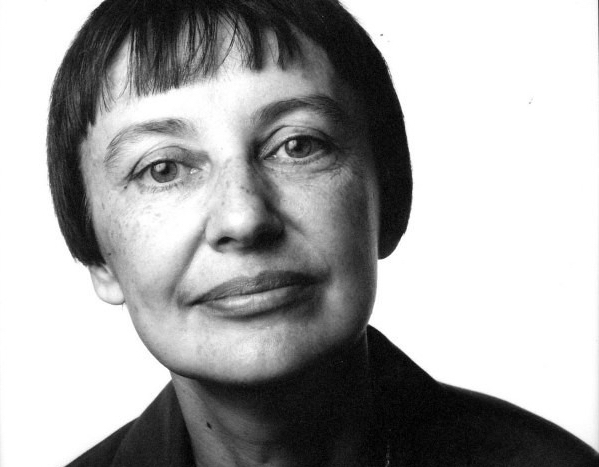
Train 2000
You are the train that leaves at zero hour
of the new year.
Again the same compartments, illuminated,
like smoke in the vast night.
The same passengers — masks on their faces,
loved, dear ones.
And vigorously clasped in the hand,
traveling glasses.
You are the train that will pour
burning wine on the skin,
so that it will blaze
madly.
So that among pillows and shelves,
slander and deception
detective flocks of night romances
will come flying.
…You are the train, the murderer and the target,
the weakness of time;
the two thousandth railway abhorrence
of an old God.
But even in the pre-cancer fog,
in the foam of a stroke —
the soul, as if it was a candle on the table,
stands in a beam of light.
Additional poems to read:
Olena Kalytiak Davis
A first-generation Ukrainian-American poet and lawyer, Olena Kalytiak Davis was born on September 16, 1963, in Michigan. Winner of both Guggenheim and Rasmuson Foundation artist fellowships, among other awards, Davis is the author of four poetry books, including The Poem She Didn’t Write and Other Poems.
“She has demonstrated that she works within, against, and around the confessional mode supplying readers with gripping syntax, referential lyrics, and textured sensuality that few contemporary poets can rival.” – Read more here.

Iryna Shuvalova
Iryna Shuvalova is a prize-winning Ukrainian poet and translator, with a BA in Philosophy from the National University of Kyiv. and a PhD from the University of Cambridge, where she focused on oral poetry in the war-affected communities.
“Shuvalova’s lyric poetry is thick with beauty, memory and sorrow; with folklore, story and song. In these superb translations the strange charm of her voice lures us, catches in our throat and threatens never to leave us.” – Read more.

Love Fish
The following video is a reading of Love Fish by Iryna Suvalova in both Ukrainian and English.
Lina Kostenko
Born in 1930in the Kyiv region of Ukraine, Lina Vasylivna Kostenko is a Ukrainian poet and writer, and recipient of the Shevchenko Award. Kostenko is a leading representative of Ukrainian poets of the sixties known as the Sixtiers, and is known for standing up for those facing prosecution.
“In the early 1960s, she faced an onslaught from the Soviet critics accusing her poetry of ‘disconnection from the real life’ and ‘formalistic experimentation’. In 1966, Lina Kostenko was blacklisted as not suitable for print and was not published for sixteen years. … In 1966, she was present at the infamous political process of the Horyn brothers in Lviv and threw flowers to the defendants.” – Read more.

A Terrible Kaleidoscope
In this moment somewhere someone dies.
In this moment. This very moment.
Each and every minute
A ship is wrecked.
The Galapagos burn.
And above the Dnipro
Sets the bitter wormwood star.
Explosion. Volcano.
Ruin. Destruction.
One aims. Another falls.
“Don’t shoot!” a third implores.
Scheherazade’s tales run dry.
Lorelei sings by the Rhine no more.
A child plays. A comet flies.
Faces bloom, not erased by dread.
Blessed is each moment we’re alive
On these worldwide fields of death.
Other poems to read:
Yulia Musakovska
Yuliya Musakovska was born in 1982 in Lviv, Ukraine. She is a Ukrainian poet and translator, and has won numerous literary awards for her poetry.
Having graduated from the National Ivan Franko University of Lviv, where she studied international relations, she has since been working in marketing and communications, in the IT industry since 2007. Yuliya also teaches marketing at Lviv IT School, as a part of Business Development course.
In June 2018 she supported an open letter by cultural leaders, politicians and human rights activists appealing to worlds’ leaders in order to stand up for defense of Oleg Sentsov, a Ukrainian director and other political prisoners jailed in Russia.
Do Not Kiss Me on the Forehead Like a Corpse
Do not kiss me on the forehead like a corpse
say, almost twice withered, the glasses and eyes themselves.
Mixed medicines with sweets, the pages of the book as yellow as his skin.
He pours a few of his precious stories into the empty space.
I see all the protagonists as old acquaintances. KGB officers squatting on the same hospital bed, in shiny Hungarian shoes — for these he could kill. The look is mocking.
He said, these Beatles, this foreign languages department, would not do you any good.
All this is for the chosen ones, not for orphans, poor relatives.
And he hid like cheese in butter, quietly like a mouse.
We caught people like you in the alleys, cut the roots.
Respectable people liked it, this was respected.
It would be for his son. For a fighting pear, for live warm meat.
I also see that woman, her crooked, bright mouth. Her
spider legs, dotted porcelain, metal tools.
A musty apartment with ceilings that are too high.
But I see him the clearest of all — strong, with a guitar.
With eyes wide open and his thumbs in the pockets of his jeans.
With thousands of book pages stored in memory.
With a face open to the world. To the dark and deep water.
Not for a girl, not for a dispute –
for the free range of arms,
for a high wave, albeit not on the shoulder.
Tetyana Bondar
Tetyana Bondar was born in Lutsk, Ukraine in 1978. After graduating from Volyn State University named after Lesya Ukrainka, she began teaching Ukrainian language and literature in Kyiv.
Her poems have appeared in the best Ukrainian literary magazines and have been widely anthologised. She has published two poetry collections, The Sanctuary of Wax Dolls (2006) and Stepping over the Rain (2010). In 2007, she won the Granoslov Literary Award.
No photograph of the poet seems to be available so instead I am sharing the cover of 28 Ukranian Contemporary Poets, which Tetyana Bondar features in.
Warriors
The warriors
of heaven and hell
are afraid of joining the battle
Yesterday they hit
the crescent moon behind their backs
having mistaken it for the enemy
they don’t know
what will happen with the border
between heaven and hell
when darkness falls
Anastasia Dmitruk
Anastasia Dmitruk is a Ukrainian poet, born in 1991 (the same year that Ukraine became independent), who writes poetry in the Russian and Ukrainian languages. Dmitruk has also worked as an information security specialist after graduating from Kyiv Polytechnic Institute.
Never ever can we be brothers, written in Russian, has become Dmitruk’s most widely cited poem. More relevant than ever today, it was written in response to the Russian occupation of Crimea in 2014. The poem celebrates the 2014 Ukrainian revolution and rejects “Great Russia”. The poem was also turned into a song by Lithuanian musicians, and sang in Russian so that the Russians could understand the messages in the poem.

Never We Will Be Brothers
We will never ever be brothers –
not by motherland, not by mothers.
Your souls aren’t free, they’re crippling –
we won’t even become step-siblings.
Our “big brother,” – we don’t believe you –
we’ll be younger, but not beneath you.
You are many, but faceless of late,
you’re enormous perhaps, we’re – great.
But you smother… orbiting zealously,
you will choke one day on your jealousy.
Freedom’s foreign to you, unattained,
from your childhood, you’ve been chained.
In your home, “silence’s golden” prevails,
but we’re raising up Molotov cocktails.
In our hearts, blood is boiling, sizzling,
and you’re kin? – you blind ones, miserly?
There’s no fear in our eyes, it’s effortless,
we are dangerous even weaponless.
We have grown, became brave outright
while the snipers held us in sight.
Executioners forced us to kneel –
we stood up and all was repealed.
Rats are hiding from us, but they’re lot
is to wash themselves clean in blood.
They are sending new orders, devising,
we are lighting the flames of uprising.
From your Tsar, our Democracy’s severed.
We will never be brothers ever
References
- Euromaidan Press – Lesia Ukrainka
- Ukraine Press – Lesia Ukrainka
- Calvert Journal – Contemporary Ukrainian Poets
- Poetry International – Natalka Bilotserkivets
- Wikipedia – Lesya Ukrainka
- Poetry International Online
- Rasmuson – Olena Kalytiak Davis
- Museum – Lina Kostenko
- Reading Kyiv – Lina Kostenko
- PEN Ukraine – Yuliya Musakovska
- The Frontier – 28 Contemporary Ukrainian Poets
- Dartmouth – Iryna Shuvalova
- Hypotheses – Oral Poetry in the Donbas
- Outlook India
- Wikipedia – Anastasia Dmitruk
- Youtube – We Will Never Be Brothers
Sharing is Caring
If you would like to share this post, you can use the image below. Thank you!


